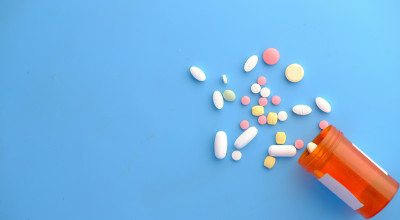Opiate vs. Opioid: What's the Difference?
January 14th, 2020
Opioids have been making national headlines due to the ongoing opioid epidemic. Opioids have impacted millions of Americans and are heard about almost daily. The crisis with opioids has affected so many Americans that it has been labeled a public health emergency. These prescription pain medicines are constantly appearing in news headlines and are being talked about more than ever.
Yet, when talking about prescription pain medicines, it’s important to know that they stretch beyond just opioids. It is important to educate yourself on the differences between opioids and other prescription pain medicines such as opiates.
Let’s learn more about the differences between opioids and opiates.
What are opioids?
You probably have heard the word opioid used recently. Most likely, it has been used to describe the ongoing prescription drug epidemic that is happening across America. While opioids are a large part of this epidemic, you may not know what exactly constitutes an opioid or what they even do to the human body.
Opioids are drugs that chemically relate to and affect the body and brain’s opioid receptors. These drugs activate the opioid receptors in the brain and body as well as in the spinal cord. These receptors are generally related to the feelings of both pain and pleasure. By activating these receptors, opioids block any pain signals that are being sent to the body or the brain. Instead, they cause large amounts of dopamine to be released all over the body. Opioids are designed to allow its user to feel pain relief. Yet, by constantly releasing large amounts of dopamine they are drugs that make the user want to keep taking them. Opioids are be highly addictive drugs and are often used wrongly and illegally.
Primarily, opioids are designed for short term use to alleviate pain as well as an anesthetic. Opioids, however, are highly addictive. This easily allows for opioid dependence to take place which can end up being deadly. The long-term use of opioids lessens the effect the drug has on the body’s opioid receptors. As a result, the body creates a tolerance to opioids which means users must take higher doses of the drug to feel what they once felt from the drug. Using opioids in higher doses often leads to fatal overdoses.
Which drugs are opioids?
Opioids can be both prescription and illicit non-prescription drugs. Opioids are synthetically made drugs that do not contain natural compounds. Most opioids are made in labs and contain very little natural matter. Opioids are generally prescribed by medical professionals as a short-term pain reliever. However, opioids are commonly misused as a non-prescription drug.
Some common opioids that are designed to be used with a prescription are:
- OxyContin
- Percocet
- Fentanyl
- Vicodin
- Kadian
- Avinza
- Imodium
- Demerol
There are also commonly known illicit drugs that fall under the category of opioids. Heroin is one of these drugs. Heroin is chemically similar to many prescription opioids and can deliver a very comparable effect as these other opioids. Yet, heroin is far more deadly and dangerous than these prescription opioids. Heroin can easily lead to fatal overdoses and can introduce users to secondary infections that can be equally deadly.
What are opiates?
Opiates are often overlooked when talking about opioids due to the similar names of the drug categories. However, opiates actually predate opioids. Opiates act much like opioids by impacting the body and nervous system’s opioid receptors, delivering a euphoric effect across the body.
An opiate is a drug that is made naturally from compounds found in the poppy plant. Opiates are primarily derived from the opium poppy. Opiates are entirely made from natural compounds and have been used for pain relief since as early as the 8th century. Like opioids, opiates are used primarily for pain relief yet are highly addictive. Opiates also flood the body with large amounts of dopamine which can lead to a desire to use more. The desire to keep using leads to a dependence like that seen in opioids. Addictions to opiates are just as deadly as with opioids due to the body creating a tolerance to the drug. Like addictions to opioids, continually using higher doses of opiates can have a deadly effect on the human body. Opiates are also considered to have a high abuse potential.
Which drugs are opiates?
Since opiates have been around since the 8th century AD, then the drugs must be fairly common?
Here are the drugs that makeup opiates:
- Opium
- Morphine
- Codeine
- Heroin
While synthetic versions of these drugs do exist, the opiate forms of these drugs are entirely refined from the opium poppy plant. These opiates have been commonly used across generations and continue to be manufactured from natural plant matter. While opiates are entirely natural substances, that does not mean they are any less addictive or deadly than their synthetic siblings. Opiates have the same effect on the body as opioids and are just as addictive.
What are the differences between Opioids and Opiates?
Both opioids and opiates have a similar effect on the body and the nervous system. Both drugs are primarily used for pain relief and flood the body with dopamine to achieve that relief. Likewise, both drugs can be highly addictive and can lead to fatal overdoses.
The difference between opioids and opiates lies in the way in which they are manufactured. Opiates are drugs that are made entirely of natural matter that is extracted from the opium poppy plant. Opioids, on the other hand, are at least partially synthetic, but most are entirely manufactured from matter created synthetically. Even if a drug does use some natural matter if it has any synthetic compounds than it falls under the category of an opioid.
Regardless, both opioids and opiates are highly addictive drugs that can lead to fatal overdoses. These are drugs that should not be taken lightly and should be used under a doctor’s orders. Consult a medical professional if you have any questions or concerns about opioids and opiates.
If you or a loved one are struggling with opioid or opiate addiction, reach out to us today. Our admissions team is available 24/7 to answer any of your questions and to make the process of getting help as easy as possible.


